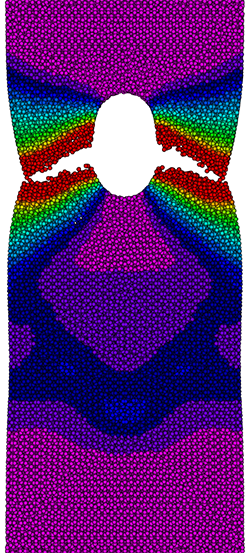Program of study
Students will take a total of eight courses to satisfy the degree requirements. To ensure breadth, students are expected to take at least two courses in engineering, at least two courses in applied mathematics, and at least two courses in data science/high performance computing. This leaves two more courses to be taken to satisfy the program requirements, and, to ensure depth, these may be taken in engineering, applied mathematics, data science, or other relevant disciplines.
Master of Science – Thesis Option
Candidates must complete a coherent plan of study based in data-enabled computational engineering and science consisting of eight graduate or advanced level courses and an acceptable thesis, which is normally sponsored by a member of the Engineering or APMA faculty.
- Students are expected to complete the Master of Science – Thesis program option in three or four semesters.
- In the three-semester format, the students are expected to take three courses in the first semester, three in the second semester, and two in the third semester.
- However, in the second and third semesters, the students may sign up for a “Special Topics: Reading Research and Design” type class (i.e., ENGN 2980 or equivalent in APMA) to satisfy the eight-course requirement.
- In the four-semester model, students are expected to take three courses in the first semester, two in the second semester, two in the third semester, and one in the fourth semester.
- In both cases, the “Special Topics: Reading Research and Design” course may be counted up to two times toward the degree.
Students should choose courses in consultation with the student's advisor to develop a coherent program. The proposed program of study must be approved by the Academic Director of Data-Enabled Computational Engineering and Science Master’s Program in the School of Engineering.
For students in a Data-Enabled Computational Engineering and Science program (Thesis Option), the approved course sequence is 2-2-2-2, where the student takes two courses in each semester. However, the program strongly recommends a sequence of 3-2-2-1 where the student takes 3 courses the first semester, 2 the second, 2 the third, and 1 the fourth. Any deviation from this schedule without consultation with the program advisor can result in additional tuition and/or penalties.
Master of Science – Non-Thesis Option
Candidates must complete a coherent plan of study based in data-enabled computational engineering and science consisting of eight graduate or advanced level courses.
- Students are expected to complete the Master of Science – Non-Thesis program option in three semesters, taking three courses in the first and second semesters, and two courses in the third semester (i.e., the 3-3-2 model).
- One-year completion is also possible with students taking four courses in the first semester and four courses in the second (i.e., the 4-4 model). The maximum duration students may take to complete will be four semesters.
Students should choose courses in consultation with the student's advisor to develop a coherent program. The proposed program of study must be approved by the Academic Director of Data-Enabled Computational Engineering and Science Master’s Program in the School of Engineering.
For students in the Data-Enabled Computational Engineering and Science program (Non-Thesis Option), the approved course sequence is 3-3-2, meaning the student takes 3 courses the first semester, 3 the second, and 2 the third. Any deviation from this schedule without consultation with the program advisor can result in additional tuition and/or penalties.
Master of Science (Non-Thesis Professional Option)
Candidates must complete a coherent plan of study based in data-enabled computational engineering and science consisting of eight graduate or advanced level courses. In addition to the course requirements, a paid or unpaid internship is a required component of the professional-track program. Assistance in obtaining internships will be provided by the School and the Brown Center for Career Exploration.
- Students are expected to complete the Master of Science – Non-Thesis program option in three semesters, taking three courses in the first and second semesters, and two courses in the third semester (i.e., the 3-3-2 model).
- The maximum duration students may take to complete will be four semesters (i.e., the 2-2-2-2 model).
- A paid or unpaid experiential learning experience of 3-6 months is a required component of the professional track program. Experiential learning can include one of the following (but not both):
- A summer internship directly related to the program of study
- Completion of ENGN 2960 (Experiential Learning in Industry (ELI)) as an elective course that counts towards the eight-course requirement. Note: students enrolled in ENGN 2960 are considered full-time students and may be counted only one time toward the degree.
Students should choose courses in consultation with the student's advisor to develop a coherent program. The proposed program of study must be approved by the Academic Director of Data-Enabled Computational Engineering and Science Master’s Program in the School of Engineering.
For students in the Data-Enabled Computational Engineering and Science program (Professional Option), the approved course sequence is 2-2-2-2, meaning the student takes 2 courses the first semester, 2 the second, 2 the third, and 2 the fourth. Any deviation from this schedule without consultation with the program advisor can result in additional tuition and/or penalties.
